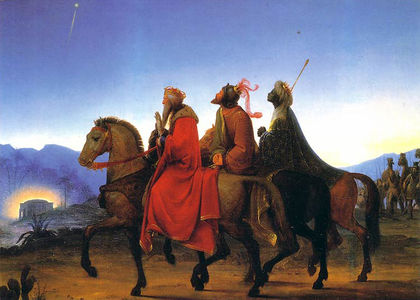Three Wise Men/is: Difference between revisions
(Created page with "Category:Himneskar verur") |
(Created page with "'''Vitringarnir þrír''' sem voru nærstaddir við fæðingu Jesú<ref>Matt. 2:1–12.</ref> voru líklega ekki konungar heldur dubbaðir upp eftir síðari hefð til að spádómurinn í Sálmi 72:11 rættist, „Allir konungar skulu lúta honum“. Heldur voru „vitringarnir frá Austurlöndum“ Töframenn, prestastétt Persa sem voru „verðir hins helgra muna, fræðingar fólksins, heimspekingar og þjónar Guðs,“ sem einnig stunduðu spádómslist, s...") |
||
| Line 2: | Line 2: | ||
[[File:Three-Wise-Men-Kupelwieser.jpg|thumb|upright=1.4|alt=The Three Wise Men on horseback looking up to the star|''Ferð konunganna þriggja'' (1825)]] | [[File:Three-Wise-Men-Kupelwieser.jpg|thumb|upright=1.4|alt=The Three Wise Men on horseback looking up to the star|''Ferð konunganna þriggja'' (1825)]] | ||
'''Vitringarnir þrír''' sem voru nærstaddir við fæðingu [[Jesú]]<ref>Matt. 2:1–12.</ref> voru líklega ekki konungar heldur dubbaðir upp eftir síðari hefð til að spádómurinn í Sálmi 72:11 rættist, „Allir konungar skulu lúta honum“. Heldur voru „vitringarnir frá Austurlöndum“ [[Töframenn]], prestastétt Persa sem voru „verðir hins helgra muna, fræðingar fólksins, heimspekingar og þjónar Guðs,“ sem einnig stunduðu spádómslist, spásagnir og stjörnuspeki. Á tímum persneska heimsveldisins voru þeir ráðgjafar konunga, kennarar fursta og voru í hávegum hafðir. | |||
<div lang="en" dir="ltr" class="mw-content-ltr"> | <div lang="en" dir="ltr" class="mw-content-ltr"> | ||
Revision as of 13:11, 19 December 2024

Vitringarnir þrír sem voru nærstaddir við fæðingu Jesú[1] voru líklega ekki konungar heldur dubbaðir upp eftir síðari hefð til að spádómurinn í Sálmi 72:11 rættist, „Allir konungar skulu lúta honum“. Heldur voru „vitringarnir frá Austurlöndum“ Töframenn, prestastétt Persa sem voru „verðir hins helgra muna, fræðingar fólksins, heimspekingar og þjónar Guðs,“ sem einnig stunduðu spádómslist, spásagnir og stjörnuspeki. Á tímum persneska heimsveldisins voru þeir ráðgjafar konunga, kennarar fursta og voru í hávegum hafðir.
The names of the three wise men are not mentioned in the Bible but appear to have arisen or been passed down through tradition. Eighth-century British historian Bede was the first to record their names as we know them today. Melchior signifies “king of light”; Caspar may come from the name of the Indian king Gondophares whom the apostle Thomas converted; Balthazar is the Chaldean name for Daniel.
The Ascended Masters El Morya, Kuthumi, and Djwal Kul were embodied as the Three Wise Men. El Morya (Melchior) brought to the Christ Child the gift of gold, Kuthumi (Balthazar) the gift of frankincense, and Djwal Kul (Caspar) the gift of myrrh. Bearing the Light of the Trinity, they charted the time and place of Jesus’ birth by astrology and the magnet of the heart: “We have seen his star in the East and are come to worship him.”
El Morya bore the flame of the Father, Brahma; Kuthumi, that of the Son, Vishnu; Djwal Kul that of the Holy Spirit, Shiva. The Trinity manifest in the threefold flame of the heart of the Christ Child was the lodestone which magnetized them through their own hearts’ Light. They were representatives of the Three-in-One. Jesus was the Three-in-One incarnate.
Sjá einnig
Heimildir
Mark L. Prophet and Elizabeth Clare Prophet, Lords of the Seven Rays
Jesus and Kuthumi, Corona Class Lessons: For Those Who Would Teach Men the Way
Pearls of Wisdom, 30. bindi, nr. 57, 26. nóvember, 1987.
- ↑ Matt. 2:1–12.
